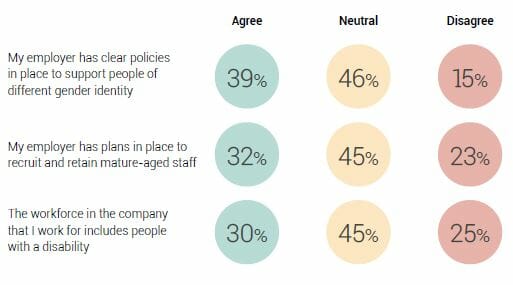The balance of power within recruitment has definitely tipped in favour of jobseekers in recent years. To avoid being stuck in an endless cycle of recruitment, this means placing a real emphasis on holding on to your existing talent. Good employee engagement is key to this.
Millennials are particularly keen to work for companies with an ethos they agree with, so an important part of a great retention strategy is your Employee Value Proposition. Previously, some businesses have treated it as a statement drafted up then filed away, fulfilling little more than an administrative exercise; nowadays it should be a core part of your employee engagement.
A highly motivated workforce not only reflects positively on you as a brand, but it increases the chance of your talent staying where they are. Engendering that loyalty makes it a vital use of your company’s resources; no wonder that, according to Deloitte, companies spent at least $1 billion in 2017 alone on improving their employee engagement.
One recent survey of technology professionals revealed that corporate social responsibility (CSR) is definitely an area that can be improved.  Respondents were presented with a number of statements regarding their employer’s diversity statements. When asked whether their employer has clear policies in place to support people of different gender identities, only 39% of respondents agreed.
Respondents were presented with a number of statements regarding their employer’s diversity statements. When asked whether their employer has clear policies in place to support people of different gender identities, only 39% of respondents agreed.
My hope is that the 46% who were unsure were simply unaware of those policies, rather than them not existing at all. Having half of your workforce not knowing where you stand as a company is still worrisome, especially when it’s such a vital part of why people want to work for you.
When asked about age diversity, the numbers also plummeted in the wrong direction. Only 32% agreed and 45% said they were unaware, with 23% actively disagreeing that their employer has plans in place. When asked about disability, the numbers dropped slightly again in a negative direction.
Clarity is important
This really underlines the importance of clarity when setting out your CSR. Promote it as part of the onboarding process, use it during recruitment and celebrate it as part of your working week. Staff who are promoting your values are your biggest advocates and are also likely to be with you in the long term.
Your company’s values will also influence potential customers, making your employees a critical piece of advertisement for your business. Research from Cone in 2017 suggested that 76% of people avoid using a company who supported a cause they disagreed on. If your staff aren’t aware of your values, you’re missing out on a big chance for others to find out too.
My opinion has always been that employee engagement isn’t just a form-filling exercise, but the beginning of how your organization brands itself internally, which will inevitably filter outwards and become a big selling point of your business, both to customers and staff. It should be the beginning of your commitment and company ethos rather than the total sum of it.
Promote your values
The easiest way to implement it is by having buy-in from C-level. As a company that recruits for the technology sector, an industry that suffers badly from a lack of female representation, we have been huge advocates for trying to improve this.
Even on smaller budgets, it’s vital that you actively try to promote the values that you are so vocal about. Even something as small as promoting volunteer work will have an effect. Make sure you communicate these achievements internally (and externally where appropriate). Employees who want to contribute to the local community are also more likely to feel a sense of community in work.
If you’ve ever looked at your retention rates and wondered how you can improve them, my suggestion would be to look at your EVP and CSR strategies and how you promote them within your company. Simple improvements and investments will likely see a correlation in your attrition rates, and the less time you spend on repeat hires will result in you making contributions that are far more important to the organization.
An engaged and motivated workforce drives any top-performing business, which is the perfect working culture to ensure the best talent remains within the organisation. Clear communication of your Corporate Social Responsibility should be the cornerstone of this.
